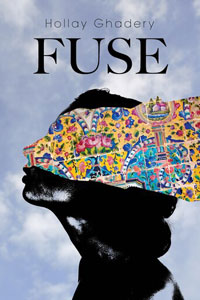I’m pleased to welcome long-time bookish friend on social media Marion Agnew to present her first guest review to this blog.
Marion Agnew lives in Northwestern Ontario, near Lake Superior. She’s published fiction and creative nonfiction; her 2019 personal essay collection, Reverberations: A Daughter’s Meditations on Alzheimer’s, was shortlisted for the Louise de Kiriline Lawrence award for nonfiction. She is currently at work on a novel.
 Fuse, by Hollay Ghadery, is a remarkable book. I’ve seen it labeled “memoir,” but I’d describe it as a collection of personal — very personal — essays. Organized around themes, the chapters include poetic fragments and reflections, narratives and insights, considerations and re-considerations. Instead of building to a narrative climax, this rich material forms a mosaic, a representation of a life that’s coherent but still in progress. Ghadery deftly supplements her lived experience with background information to give readers insight into a larger cultural context.
Fuse, by Hollay Ghadery, is a remarkable book. I’ve seen it labeled “memoir,” but I’d describe it as a collection of personal — very personal — essays. Organized around themes, the chapters include poetic fragments and reflections, narratives and insights, considerations and re-considerations. Instead of building to a narrative climax, this rich material forms a mosaic, a representation of a life that’s coherent but still in progress. Ghadery deftly supplements her lived experience with background information to give readers insight into a larger cultural context.
And culture, in many iterations, lies at the core of this book. She explores clashes around Iranian-Canadian identity, both in her own life — in her own mind/body and in her community — and in the varying degrees of closeness and understanding in the relationship between her English-Canadian mother and Iranian-Canadian father. She looks at what it’s like to be culturally Muslim in a theoretically secular (but really waning-Western-Christian) society, and how differently her two brothers respond to their family’s nominal exposure to Islam.
Her subjects range widely: Life in a family, with its sometimes well-meaning expectations. Life in a human body, with its imperfections and demands that change with time and our experiences (pregnancy, fitness or lack thereof, age) of it. Life in a country with loud demands for conformity around all of the above, plus definitions of beauty.
Ghadery takes us along in her many attempts to make sense of these demands, through binging/purging food, starving, running, booze, men, and cleaning. All are forms of her drive to create and maintain order in the chaos of life.
And she doesn’t shy away from naming what she finds, in herself and in others. Here’s an example, about how people line up a stack of papers or wipe down a kitchen counter, then say, “I’m so OCD”:
“I have to swallow hot anger when I hear these comments. My disease has taken over my life. It’s made it so I’ve considered taking my own life rather than live for one more moment in my own head. And when I wasn’t actively thinking about killing myself, I was passively trying to kill myself by drinking and using prescribed pharmaceuticals.”
She adds this energizing, satisfying summary, one I’ve wished for to combat “jokes” around dementia:
“Increasing dialogue to create more knowledge about mental illness is great. Casual appropriation of these illnesses is not.”
Yes, this book might be difficult for some people to read, but it will be transformative for others. In sharing her actions, Ghadery is searingly honest — yet her exposure isn’t performative. There’s no parade: “look at me, I’m drinking vodka at all hours, fighting with everyone, and quitting yet another job!”
Instead, she owns these actions and their role in her life. Many of them were physically harmful, all of them were attempts to lessen spiritual pain. And all are part of her, part of what she has fused to create herself—a complicated woman and skilled writer.
Learn more about Fuse by Hollay Ghadery [Guernica Editions (MiroLand)] here.
